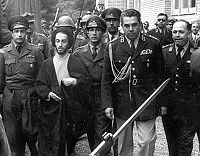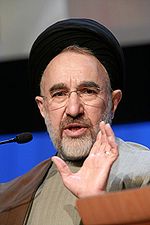- Clericalism in Iran
-
Clericalism in Iran (Persian: کارنامه و تاريخچه روحانيت در ايران) has a long history and had remarkable impact on Iranian society, politics as well as on Islamic theology.
Contents
Emergence
There are controversies about the emergence of clericalism in Iran. Some scholars believe that clericalism dates back to 1000 years ago.[1]
Schools
Shia:
Sunni:
- Zahedan seminaries
Structure and functions:
Over the course of history, Iranian seminaries have had traditional functions in the religious sphere to provide support to civil society in the country. However after the Iranian revolution in 1979, seminaries have been highly politicized and their independence greatly reduced.[2] The revolution created a new political order based on Shiite theological foundations and the absolute ruling power was given to a Shiite jurist/cleric.[3]
The history of Qom seminaries dates back to 3rd century (Hijri). Hossein Ibn Said Ahvazi, a famous theologian, moved from Kufa to Qom. He educated the first generation of clerics in Qom.[4]
Impact on economy
Many clerics have been involved in high profile economic activities, most notably Akbar Hashemi Rafsanjani, Abbas Vaez-Tabasi and Nasser Makarem Shirazi.
Impact on Iranian politics
Clerics involved in politics during Safavid and Qajar era
- Allameh Majlesi
- Mirza Shirazi
- Seyyed Jamaluddin Asadabadi (Afghani)
Clerics involved in Iranian Constitutional Revolution
- Seyyed Mohammad Tabataba'i
- Seyyed Abdollah Behbehani
- Sheikh Mohammad Khiabani
- Mohammad Kazem Khorasani
- Sheikh Fazlollah Nouri (against the Constitutional Revolution)
- Mohammed Kazem Yazdi (against the Constitutional Revolution)
Influential Clerics of Pahlavi era
- Seyyed Hassan Modarres
- Seyyed Abolghasem Kashani
- Navvab Safavi
- Sheikh Mohammad Taghi Falsafi
Clerics involved in Iranian revolution
- Ruhollah Khomeini
- Hosseinali Montazeri
- Morteza Motahhari
- Mohammad Beheshti
Clerics acted as high officials
- Ali Khamenei
- Akbar Hashemi Rafsanjani
- Mohammad Khatami
- Mohammad Yazdi
- Ali Meshkini
- Mahmoud Hashemi Shahroudi
- Ahmad Jannati
- Mehdi Karroubi
Political parties founded by clerics
Institutions exclusively associated with clerics
- Special court for clerics
Impact on other societies
- Ali Sistani
References
- ^ (Persian) ديدگاههاي رياست جمهوري
- ^ Project Syndicate
- ^ Qantara.de - Iran's Political Clerics - The Absence of a Credible Religious Authority
- ^ طظˆط²ظ‡ - ظ…ظ‚ط§ظ„ط§طھ -طظˆط²ظ‡ ط¹ظ„ظ…غŒظ‡ ظ‚ظ… - ط³غŒط¯ع©ط¨ط§ط±غŒطŒ ط³غŒط¯ ط¹ظ„غŒط±ط¶ط§
See also
- Islam in Iran
- History of Qom seminaries (in Persian)
- Organization of Shafei Sunni Clericalism in Iran (in Persian)
- Organization of Hanafi Sunni Clericalism in Iran (in Persian)
Categories:
Wikimedia Foundation. 2010.



